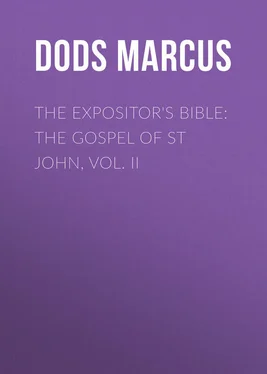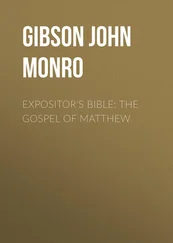Marcus Dods - The Expositor's Bible - The Gospel of St John, Vol. II
Здесь есть возможность читать онлайн «Marcus Dods - The Expositor's Bible - The Gospel of St John, Vol. II» — ознакомительный отрывок электронной книги совершенно бесплатно, а после прочтения отрывка купить полную версию. В некоторых случаях можно слушать аудио, скачать через торрент в формате fb2 и присутствует краткое содержание. Издательство: Иностранный паблик, Жанр: foreign_religion, foreign_antique, foreign_prose, на английском языке. Описание произведения, (предисловие) а так же отзывы посетителей доступны на портале библиотеки ЛибКат.
- Название:The Expositor's Bible: The Gospel of St John, Vol. II
- Автор:
- Издательство:Иностранный паблик
- Жанр:
- Год:неизвестен
- ISBN:нет данных
- Рейтинг книги:5 / 5. Голосов: 1
-
Избранное:Добавить в избранное
- Отзывы:
-
Ваша оценка:
- 100
- 1
- 2
- 3
- 4
- 5
The Expositor's Bible: The Gospel of St John, Vol. II: краткое содержание, описание и аннотация
Предлагаем к чтению аннотацию, описание, краткое содержание или предисловие (зависит от того, что написал сам автор книги «The Expositor's Bible: The Gospel of St John, Vol. II»). Если вы не нашли необходимую информацию о книге — напишите в комментариях, мы постараемся отыскать её.
The Expositor's Bible: The Gospel of St John, Vol. II — читать онлайн ознакомительный отрывок
Ниже представлен текст книги, разбитый по страницам. Система сохранения места последней прочитанной страницы, позволяет с удобством читать онлайн бесплатно книгу «The Expositor's Bible: The Gospel of St John, Vol. II», без необходимости каждый раз заново искать на чём Вы остановились. Поставьте закладку, и сможете в любой момент перейти на страницу, на которой закончили чтение.
Интервал:
Закладка:
Marcus Dods
The Expositor's Bible: The Gospel of St John, Vol. II
I. THE ANOINTING OF JESUS
“Jesus therefore six days before the Passover came to Bethany, where Lazarus was, whom Jesus raised from the dead. So they made Him a supper there: and Martha served; but Lazarus was one of them that sat at meat with Him. Mary therefore took a pound of ointment of spikenard, very precious, and anointed the feet of Jesus, and wiped His feet with her hair: and the house was filled with the odour of the ointment. But Judas Iscariot, one of His disciples, which should betray Him, saith, Why was not this ointment sold for three hundred pence, and given to the poor? Now this he said, not because he cared for the poor; but because he was a thief, and having the bag took away what was put therein. Jesus therefore said, Suffer her to keep it against the day of My burying. For the poor ye have always with you; but Me ye have not always. The common people therefore of the Jews learned that He was there: and they came, not for Jesus’ sake only, but that they might see Lazarus also, whom He had raised from the dead. But the chief priests took counsel that they might put Lazarus also to death; because that by reason of him many of the Jews went away, and believed on Jesus.” – John xii. 1–11.
This twelfth chapter is the watershed of the Gospel. The self-manifestation of Jesus to the world is now ended; and from this point onwards to the close we have to do with the results of that manifestation. He hides Himself from the unbelieving, and allows their unbelief full scope; while He makes further disclosures to the faithful few. The whole Gospel is a systematic and wonderfully artistic exhibition of the manner in which the deeds, words, and claims of Jesus produced, – on the one hand, a growing belief and enthusiasm; on the other, a steadily hardening unbelief and hostility. In this chapter the culmination of these processes is carefully illustrated by three incidents. In the first of these incidents evidence is given that there was an intimate circle of friends in whose love Jesus was embalmed, and His work and memory insured against decay; while the very deed which had riveted the faith and affection of this intimate circle is shown to have brought the antagonism of His enemies to a head. In the second incident the writer shows that on the whole popular mind Jesus had made a profound impression, and that the instincts of the Jewish people acknowledged Him as King. In the third incident the influence He was destined to have and was already to some extent exerting beyond the bounds of Judaism is illustrated by the request of the Greeks that they might see Jesus.
In this first incident, then, is disclosed a devotedness of faith which cannot be surpassed, an attachment which is absolute; but here also we see that the hostility of avowed enemies has penetrated even the inner circle of the personal followers of Jesus, and that one of the chosen Twelve has so little faith or love that he can see no beauty and find no pleasure in any tribute paid to his Master. In this hour there meet a ripeness of love which suddenly reveals the permanent place which Jesus has won for Himself in the hearts of men, and a maturity of alienation which forebodes that His end cannot be far distant. In this beautiful incident, therefore, we turn a page in the gospel and come suddenly into the presence of Christ’s death. To this death He Himself freely alludes, because He sees that things are now ripe for it, that nothing short of His death will satisfy His enemies, while no further manifestation can give Him a more abiding place in the love of His friends. The chill, damp odour of the tomb first strikes upon the sense, mingling with and absorbed in the perfume of Mary’s ointment. If Jesus dies, He cannot be forgotten. He is embalmed in the love of such disciples.
On His way to Jerusalem for the last time Jesus reached Bethany “six days before the Passover” – that is to say, in all probability 1 1 It is uncertain whether the “six days” are inclusive or exclusive of the day of arrival and of the first day of the Feast. It is also uncertain on what day of the week the Crucifixion happened.
on the Friday evening previous to His death. It was natural that He should wish to spend His last Sabbath in the congenial and strengthening society of a family whose welcome and whose affection He could rely upon. In the little town of Bethany He had become popular, and since the raising of Lazarus He was regarded with marked veneration. Accordingly they made Him a feast, which, as Mark informs us, was given in the house of Simon the leper. Any gathering of His friends in Bethany must have been incomplete without Lazarus and his sisters. Each is present, and each contributes an appropriate addition to the feast. Martha serves; Lazarus, mute as he is throughout the whole story, bears witness by his presence as a living guest to the worthiness of Jesus; while Mary makes the day memorable by a characteristic action. Coming in, apparently after the guests had reclined at table, she broke an alabaster of very costly spikenard 2 2 In The Classical Review for July 1890 Mr. Bennett suggests that the difficult word πιστικῆς should be written πιστακῆς, and that it refers to the Pistacia terebinthus , which grows in Cyprus and Judæa, and yields a very fragrant and very costly unguent.
and anointed the feet of Jesus and wiped His feet with her hair.
This token of affection took the company by surprise. Lazarus and his sisters may have been in sufficiently good circumstances to admit of their making a substantial acknowledgment of their indebtedness to Jesus; and although this alabaster of ointment had cost as much as would keep a labouring man’s family for a year, this could not seem an excessive return to make for service so valuable as Jesus had rendered. It was the manner of the acknowledgment which took the company by surprise. Jesus was a poor man, and His very appearance may have suggested that there were other things He needed more urgently than such a gift as this. Had the family provided a home for Him or given Him the price of this ointment, no one would have uttered a remark. But this was the kind of demonstration reserved for princes or persons of great distinction; and when paid to One so conspicuously humble in His dress and habits, there seemed to the uninstructed eye something incongruous and bordering on the grotesque. When the fragrance of the ointment disclosed its value, there was therefore an instantaneous exclamation of surprise, and at any rate in one instance of blunt disapproval. Judas, instinctively putting a money value on this display of affection, roundly and with coarse indelicacy declared it had better have been sold and given to the poor.
Jesus viewed the act with very different feelings. The rulers were determining to put Him out of the way, as not only worthless but dangerous; the very man who objected to this present expenditure was making up his mind to sell Him for a small part of the sum; the people were scrutinising His conduct, criticising Him; – in the midst of all this hatred, suspicion, treachery, coldness, and hesitation comes this woman and puts aside all this would-be wisdom and caution, and for herself pronounces that no tribute is rich enough to pay to Him. It is the rarity of such action, not the rarity of the nard, that strikes Jesus. This, He says, is a noble deed she has done, far rarer, far more difficult to produce, far more penetrating, and lasting in its fragrance than the richest perfume that man has compounded. Mary has the experience that all those have who for Christ’s sake expose themselves to the misunderstanding and abuse of vulgar and unsympathetic minds; she receives from Himself more explicit assurance that her offering has given pleasure to Him and is gratefully accepted. We may sometimes find ourselves obliged to do what we perfectly well know will be misunderstood and censured; we may be compelled to adopt a line of conduct which seems to convict us of heedlessness and of the neglect of duties we owe to others; we may be driven to action which lays us open to the charge of being romantic and extravagant; but of one thing we may be perfectly sure – that however our motives are mis-read and condemned by those who first make their voices heard, He for whose sake we do these things will not disparage our action nor misunderstand our motives. The way to a fuller intimacy with Christ often lies through passages in life we must traverse alone.
Читать дальшеИнтервал:
Закладка:
Похожие книги на «The Expositor's Bible: The Gospel of St John, Vol. II»
Представляем Вашему вниманию похожие книги на «The Expositor's Bible: The Gospel of St John, Vol. II» списком для выбора. Мы отобрали схожую по названию и смыслу литературу в надежде предоставить читателям больше вариантов отыскать новые, интересные, ещё непрочитанные произведения.
Обсуждение, отзывы о книге «The Expositor's Bible: The Gospel of St John, Vol. II» и просто собственные мнения читателей. Оставьте ваши комментарии, напишите, что Вы думаете о произведении, его смысле или главных героях. Укажите что конкретно понравилось, а что нет, и почему Вы так считаете.












